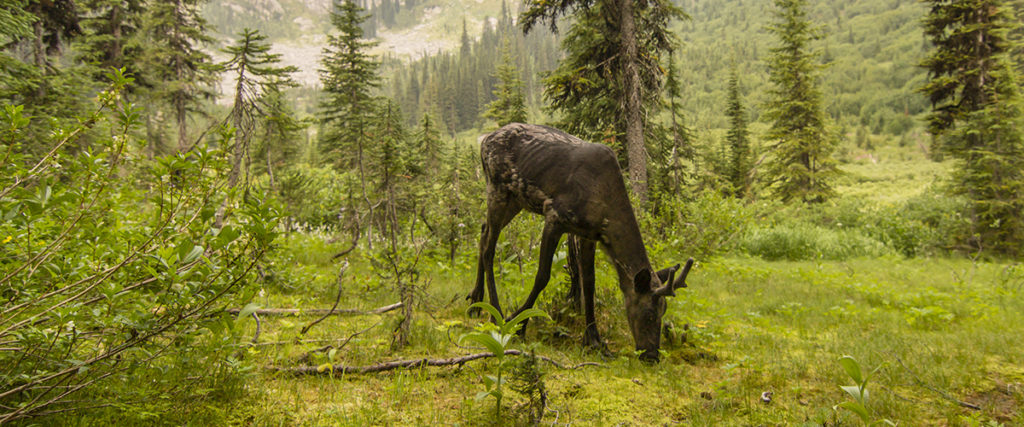Last stand for America’s rarest mammal
From the Summer 2018 Issue
Photo by David Moskowitz

After devastating loss, tiny caribou band needs help to survive
Since the first explorers and settlers came here, the mountains of northern Idaho have held a small population of mountain caribou—probably the rarest large mammal in the U.S. With their oversize hooves adapted for walking in snow, distinctive antlers and gentle appearance, this subspecies of North American reindeer is rarely seen even by the most ardent outdoorsmen.
The tiny herd that lives in the southern Selkirk Mountains, which roams much of the year north into Canada, has barely clung to survival for years. In 2017, the annual survey counted 11 caribou.
This spring brought even worse news. Aerial surveys counted just three caribou, all cows and none pregnant. Biologists don’t know what may have killed most of the band, but the caribou thrive in the high snowy mountains in winter and some guess that an avalanche could have decimated the herd.
With only three remaining, a story in the New York Times in April reported the caribou as “functionally extinct.”
Not so fast, say local Indian tribes and conservation groups who have been fighting for caribou recovery for years. The groups that form the Mountain Caribou Initiative in late April declared, “it most certainly is not ‘game over.’”
This past winter the Kalispel Tribe had high hopes to begin a maternal penning project, in which pregnant caribou cows would be captured and kept in the security of a 19-acre enclosure to birth and rear their calves before release back to the wild. That project is still possible for next year, said Mike Lithgow, Kalispel outreach coordinator. However, he noted, as the herd spends much of the year in Canada, wildlife agencies in British Columbia will have to decide how to move forward.
Cheryl Moody, executive director of the Selkirk Conservation Alliance, echoes the importance for both Canadian and U.S agencies to sign on to continued recovery efforts. And she wants citizens who share concern to get involved. “We encourage everyone to raise their voices in support of the caribou—in both the U.S. and Canada,” said Moody.
Officials with the lead U.S. agency in caribou recovery give positive signals that the effort is not over.
“The U.S. Fish and Wildlife Service is an active participant in the conservation and recovery of both the South Selkirk herd and the southern mountain caribou,” said Sarah Levy, USFWS public affairs officer. “The conservation of this species is a binational, collaborative effort, and we are working closely with multiple partners in Idaho, Washington, Canada, and Tribes and First Nations.”
That it is a matter of international significance reflects the history of the woodland caribou. They were once plentiful not just here in Idaho but along the northern tier states of the U.S. In the early 1800s, Maine had as many as 5,000 caribou, but they were reported driven extinct by 1838. In northern Minnesota the species—distinct from the caribou that roam the tundra of Alaska—may have numbered up to 10,000 animals but was considered wiped out after a final lone bull was spotted in the 1940s.
So far, the Idaho herd has avoided that fate—but just barely. “We will not give up hope and we ask others to join us in this,” said Moody.
For further information:
Mountain Caribou Initiative: www.caribourainforest.org/action
Kalispel Tribe: www.kalispeltribe.com
Kootenai Tribe: www.restoringthekootenai.org
Selkirk Conservation Alliance: www.scawild.org




I stand with protecting caribou.
Copy, past, and send this email, or your own, today to:
Justin Trudeau, Catherine McKenna, John Horgan, George Heyman, and Doug Donaldson at : [email protected], [email protected], [email protected], [email protected], [email protected]
Subject : Save the South Selkirk and South Purcell Mountain Caribou
Dear Prime Minister Trudeau,
Please take all immediate emergency actions possible to save the last 7 Southern Mountain Caribou in the South Selkirk and South Purcell International Herds. The 3 Selkirk sisters and the 3 Purcell brothers and 1 sister have one last chance to survive, which is to merge the two herds through translocation to a Bonding and Maternity Penning Facility at the Nature Conservancy of Canada Darkwoods Conservation Area in March of 2019. After years of failures by governments on both sides of the US and Canadian border, we owe them at least this much of an effort.
Wildlife advocates on both sides of the border have been working tirelessly with government agencies and Native Tribes and Nations to save these two vanishing international herds of Southern Mountain Caribou. Too many delays, an exceptionally difficult winter just past, a lack of funding, and the difficulty of coordinating international efforts have pushed these beautiful, unique, and majestic animals to the vanishing point. It is time for decisive action now.
Wildlife Biologists from BC Forests, Lands, and Natural Resources, the Kalispel Tribe of Washington, and other agencies, including the Selkirk Caribou International Technical Working Group (Sky Twig), have proposed to merge the South Selkirk and South Purcell herds not only in an effort to save them. but also to take the first steps in developing genetic augmentation techniques necessary for the long range survival of other isolated, inbreeding herds of the endangered Southern Mountain Caribou in Canada, whose recovery is threatened according to recent statements by Environment and Climate Change Canada.
A maternal pen project for the South Selkirk Mountain Caribou was initiated in September of 2017 at the NCC Darkwoods site, and with some repairs due to damage caused by an excessive snow pack last winter, it could be made ready by this fall for caribou capture next spring. Volunteers gathered arboreal lichen much of last year as a food source for transitioning the caribou into the maternal / bonding pen, and that supply not used this past spring is still good and volunteer efforts to collect more could be ramped up fairly quickly to gather more lichen and provide other support needed.
Even if this attempt is not successful, we will learn valuable lessons for the long range recovery efforts for other Southern Mountain Caribou herds. We can not in good conscience turn our backs on them.
Please take the time to watch this extraordinary film “The Last Mountain Caribou” by Bryce Comer, who spent 9 years making this intimate tale of the South Selkirk Mountain Caribou, and you will understand why so many of us on both sides of the border are so passionately dedicated to do all that we can to save and recover them. It is free for viewing at: https://vimeo.com/229170099
We will likely learn something about saving ourselves through our efforts to save the Mountain Caribou and their unique inland old growth rain forest habitat, also home to other endangered species such as Grizzlies, Lynx, and Wolverine.
Thank you for your consideration and for taking decisive, bold action to save the South Selkirk and South Purcell Mountain Caribou.
Respectfully,